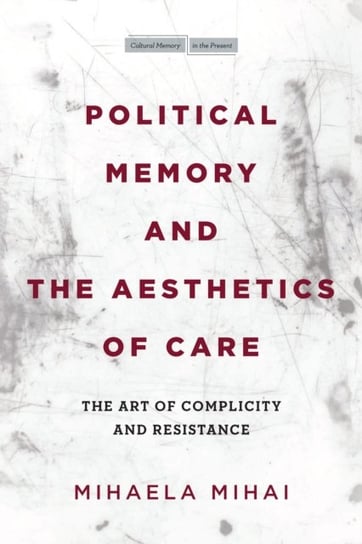
Political Memory and the Aesthetics of Care The Art of Complicity and Resistance (2022) Mihaela Mihai
We tend to equate care and acts of care with tidiness. In this interdisciplinary book, political theorist Mihaela Mihai confronts histories of systemic violence, questioning who is included and excluded. The effects of neat narratives come with significant costs for the present.
Central to Mihai’s argument is that hegemonic narratives of complex violence often entail a double erasure of “pervasive complicity and impure resistance” (p. 5) in the “ecology of violence” (p. 68). By considering recent literature in care ethics and aesthetics she points to artistic practices of interpretive and “mnemonic care” to tackle historical injustices (“troubleshoot our mnemonic imagination”, p. 241) by considering the memory of complicity and resistance.
Given the difficulties of challenging firmly community-held and often state-supported official narratives of heroism and villainy, Mihai argues that “[…] some artworks can become valuable instruments against epistemic erasures” (pp. 48-49) and unsettling hegemonic scripts. Yes “[…] certain works can seductively sabotage our attachments to dominant— comfortable and reductive— narratives about the past […]” (p. 9) yet, artworks can equally seductively perpetuate established narratives. This dual operation of artworks could be explored further. Equally, there is a possibility that artworks can be rich enough to do both and a deconstructive reading could allow for hidden meanings to be revealed.
Methodologically Mihai applies a three-stepped “critical-hermeneutical exercise” (12). This begins with a description of the establishment and implementation of the misremembering of complicity and resistance. It then considers the political, epistemic, and ethical consequences of the established narratives. Finally, she proposes strategies for challenging and complicating remembrance. The work of undoing, unlearning even, historical expurgations, is presented as the “labor of aesthetic care for memory” (p. 52) on behalf of artists and writers (“caring refuseniks”). Concretely, she argues “[…] that artists who, through their work, chip away at dominant mythologies by uncovering their blind spots care for memory via aesthetic means.” (p. 16) This then is more an artistic practice of memory care than an aesthetics of care per se.
Chapters 3-5 in turn specifically apply this approach to a range of artistic responses to Vichy France, communist Romania, and apartheid South Africa. Each of these are worth reading on their own terms. What they reveal is that the work of the artists as caring “refuseniks help us see not only how much is at stake in mnemonic excisions but also how difficult it is to undo them” (p. 235). Crucially in following the same format, they offer a structure that could be straightforwardly applied to other contexts.
Some criticisms: A greater acknowledgment of the “caring refuseniks” as new myth makers would be an angle work exploring. Very little, if any, evidence is offered for the success of artists in overturning accepted official narratives. Mihai limits her approach to content at the expense of form. This is a limitation as the form promoted for remembrance in art is not inconsequential or politically neutral. In other words, there is a space for this approach to be extended in terms of a formal analysis. After all, artistic form can be central to the reception of the works of memory. Is, for example, a sculpture public or not? Is it collectively or solitarily beheld? Furthermore, Mihai considers novels and film but the approach could be extended to other forms. The absence of images is frustrating and a more detailed analysis of scenes would enhance the approach, especially given the focus on content. Finally, Mihai is limited to national contexts. It would be interesting to apply this approach to an international context (for example the Covid-19 pandemic or Climate Change). Nonetheless, this is a very useful text.
Connell Vaughan
TU Dublin
Mihaela Mihai Political Memory and the Aesthetics of Care The Art of Complicity and
Resistance Stanford University Press 2022
ISBN: 9781503630123
